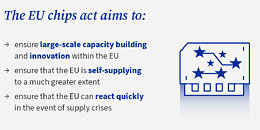TheLostSwede
News Editor
- Joined
- Nov 11, 2004
- Messages
- 18,209 (2.45/day)
- Location
- Sweden
| System Name | Overlord Mk MLI |
|---|---|
| Processor | AMD Ryzen 7 7800X3D |
| Motherboard | Gigabyte X670E Aorus Master |
| Cooling | Noctua NH-D15 SE with offsets |
| Memory | 32GB Team T-Create Expert DDR5 6000 MHz @ CL30-34-34-68 |
| Video Card(s) | Gainward GeForce RTX 4080 Phantom GS |
| Storage | 1TB Solidigm P44 Pro, 2 TB Corsair MP600 Pro, 2TB Kingston KC3000 |
| Display(s) | Acer XV272K LVbmiipruzx 4K@160Hz |
| Case | Fractal Design Torrent Compact |
| Audio Device(s) | Corsair Virtuoso SE |
| Power Supply | be quiet! Pure Power 12 M 850 W |
| Mouse | Logitech G502 Lightspeed |
| Keyboard | Corsair K70 Max |
| Software | Windows 10 Pro |
| Benchmark Scores | https://valid.x86.fr/yfsd9w |
The Council has today approved the regulation to strengthen Europe's semiconductor ecosystem, better known as the 'Chips Act'. This is the last step in the decision-making procedure. The Chips Act aims to create the conditions for the development of a European industrial base in the field of semiconductors, attract investment, promote research and innovation and prepare Europe for any future chip supply crisis. The programme should mobilise €43 billion in public and private investment (€3.3 billion from the EU budget), with the objective of doubling the EU's global market share in semiconductors, from 10% now to at least 20% by 2030.
With the Chips Act, Europe will be a frontrunner in the world semiconductors race. We can already see it in action: new production plants, new investments, new research projects. And in the long run, this will also contribute to the renaissance of our industry and the reduction of our foreign dependencies. - Héctor Gómez Hernández, Spanish Minister for Industry, Trade and Tourism


Next steps
Following the Council's approval today of the European Parliament's position, the legislative act has been adopted.
After being signed by the President of the European Parliament and the President of the Council, the regulation will be published in the Official Journal of the European Union and will enter into force on the third day following its publication.
The Council has also passed an amendment to the regulation establishing the joint undertakings under Horizon Europe, to allow the establishment of the chips joint undertaking, which builds upon and renames the existing key digital technologies joint undertaking. The amendment was approved by the Council today following consultation with the Parliament. Both texts will be published in the Official Journal at the same time.
Background
Chips are small devices composed of semiconductors (materials capable of allowing or blocking the flow of electricity) and able to store large quantities of information or perform mathematical and logical operations. They are essential for a wide range of daily-use products, from credit cards to cars or smartphones. With the development of artificial intelligence, 5G networks and the internet of things, demand and market opportunities for chips and semiconductors are expected to grow substantially.
Currently, Europe is too dependent on chips produced abroad, which became even more evident during the COVID-19 crisis. Industry and other strategic sectors such as health, defence and energy faced supply disruptions and shortages. The Chips Act aims to reduce the EU's vulnerabilities and dependencies on foreign actors while reinforcing the EU's industrial base for chips, maximising future business opportunities and creating good-quality jobs. This will improve the EU's security of supply, resilience, and technological sovereignty in the field of chips.
View at TechPowerUp Main Site | Source
With the Chips Act, Europe will be a frontrunner in the world semiconductors race. We can already see it in action: new production plants, new investments, new research projects. And in the long run, this will also contribute to the renaissance of our industry and the reduction of our foreign dependencies. - Héctor Gómez Hernández, Spanish Minister for Industry, Trade and Tourism


Next steps
Following the Council's approval today of the European Parliament's position, the legislative act has been adopted.
After being signed by the President of the European Parliament and the President of the Council, the regulation will be published in the Official Journal of the European Union and will enter into force on the third day following its publication.
The Council has also passed an amendment to the regulation establishing the joint undertakings under Horizon Europe, to allow the establishment of the chips joint undertaking, which builds upon and renames the existing key digital technologies joint undertaking. The amendment was approved by the Council today following consultation with the Parliament. Both texts will be published in the Official Journal at the same time.
Background
Chips are small devices composed of semiconductors (materials capable of allowing or blocking the flow of electricity) and able to store large quantities of information or perform mathematical and logical operations. They are essential for a wide range of daily-use products, from credit cards to cars or smartphones. With the development of artificial intelligence, 5G networks and the internet of things, demand and market opportunities for chips and semiconductors are expected to grow substantially.
Currently, Europe is too dependent on chips produced abroad, which became even more evident during the COVID-19 crisis. Industry and other strategic sectors such as health, defence and energy faced supply disruptions and shortages. The Chips Act aims to reduce the EU's vulnerabilities and dependencies on foreign actors while reinforcing the EU's industrial base for chips, maximising future business opportunities and creating good-quality jobs. This will improve the EU's security of supply, resilience, and technological sovereignty in the field of chips.
View at TechPowerUp Main Site | Source

